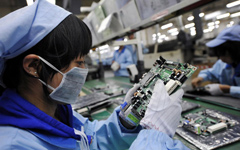He Yu, vice-mayor of Dongguan, urged local processing trade companies to focus more on the domestic market by promoting their products online.
|
 |
|
 |
"The domestic market will be one of the most important destinations for the processing trade industry, as there's huge business potential, especially in the e-commerce market," He said.
In recent years, the export value of processing trade products in Dongguan grew only "slowly", according to Cai Kang, deputy director of the Dongguan Bureau of Foreign Trade and Economic Cooperation.
In contrast, the export value of general trade products increased sharply, rising 38.8 percent year-on-year in the first four months of 2014, according to Cai.
Organizers of the fair launched an online application on Wednesday. The app gives users easy access to promote their processing trade products on major Chinese online platforms such as Wechat, Taobao, Tmall and QQ.
Nearly 1,000 manufacturers have become members of the e-commerce platform affiliated with the annual fair, which also includes some 43,200 registered online sellers.
More local processing trade companies have also started shifting their manufacturing overseas to escape rising domestic labor and production costs and tap into overseas markets.
For example, Dongguan-based Huajian Group, one of China's largest producers of shoes for women, has invested in a large manufacturing base in Ethiopia. That facility has greatly helped the company boost sales over the past few years, company sources said.
Wang Jing, sales director of Yimei Shoes Co Ltd, said the company's facilities in Myanmar had helped offset business downturns in the overseas market.
"We opened manufacturing facilities in Myanmar because the labor and production costs are relatively cheaper. Rising domestic costs, combined with falling demand from overseas buyers, have squeezed profits in recent years," Wang said.
